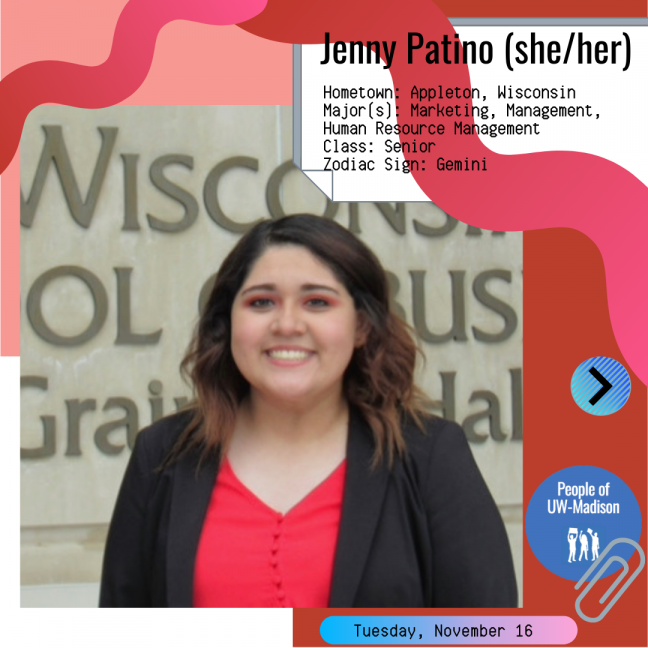Editor’s note: People of Madison is a weekly series produced by Digital Features Associates. The series — published online and on our social media accounts — aims to highlight a student at UW making an impact on the campus community. These Q&As are lightly edited for clarity and style.
JENNY PATINO
Why did you decide to major in the studies that you chose?
Originally, I wanted to go into some sort of consulting role. In high school, I was involved in DECA, so I had gotten exposed to a lot of business areas and found that I really was drawn to the business world in general. I ended up choosing marketing because you can do so much with a degree in marketing. As I continued through my studies over the last four years, I realized I really enjoyed working with other people. That’s how I decided upon the additional major of management. I ended up picking up human resources because I wanted to broaden my horizons, learn about different fields of business and see how I could apply them in the future.
How do you wish to impact the world with your studies?
I took a job offer with Kohl’s, so I’m currently pursuing the retail management path. I’ve been impacted by managers in my time at Kohl’s as a part-time associate. They’re able to lead so effectively and have been able to create such a connection with me from the time I was 17 — now I’m 21. Being able to create connections with the people I would lead can really drive a much more impactful experience. I think being exposed to all different areas of business has helped me be open minded, which is really important today. You have such a diverse workforce that you’re able to make connections. I feel my majors and experience with retail has really opened me up to wanting to create more connections with people and drive experiences in that way.
Could you talk about DECA and how you first got involved?
DECA is a professional development organization geared towards developing students for their future career endeavors. At the UW chapter specifically, we focus on three main components — competition, community service and professional development. The case study competitions are on-the-spot business scenarios. You have to create a solution in 30 or 60 minutes and present that solution to a judge. In order to score well, there are specific metrics you need to hit to move to the next competition. We also focus on community service. In the past, we have volunteered at Second Harvest Food Bank and River Food Pantry. In terms of professional development, we bring in a lot of speakers from different areas of business. For example, we had someone from First Business Financial American Family share about their experiences in the world once they graduated college.
I got involved in DECA seven years ago when I was a sophomore in high school. It’s crazy that it’s been that long. One of my friends who enjoyed it for the social aspects recommended it to me. I ended up finding that I was really drawn to all the aspects of the business case study competitions. I found myself interested in being more involved in DECA at the collegiate level because it is more student-run than in high school. In high school, you have an advisor planning all the conferences and events, but in college, you get the experience of planning a conference or creating a budget. I was the vice president my sophomore year and the president of the UW chapter last year. Last spring, I ran for state office and was elected the first state president from UW, which is a cool feature because we’ve never had someone from UW involved in a role within our state organization.
Why do you think that organizations like DECA are essential on college campuses?
I think it’s important that as we go through our undergraduate studies we become professionally well-rounded. Yes, we get to learn a lot in the classroom about marketing subjects, finance and cash flow statements, but I really feel like the real-life application I’ve gotten from DECA has set me apart from others in terms of the interview process and being prepared to have a role for myself before graduating college. These student organizations do a really good job of preparing people to be professionals because you don’t necessarily get that in the classroom. All these extracurriculars make so much of a difference once you get out in the workforce.
In what ways has the progression of your growth in leadership altered your perception of business?
Leadership has taught me better time management. Obviously, once you start taking on more leadership roles, you have to really know how to balance your time. People management skills are super important, especially if you plan on going into a manager role one day. I think that is such an important skill that everyone should have because you’re always going to be working with people. The business world is super collaborative nowadays. Even in the business school, I feel like most of my classes always have some sort of group project component.
What is your favorite part about being a member and a leader of DECA?
I always tell people my favorite part is the award ceremony at competition and seeing everyone’s hard work pay off, whether it be qualifying for nationals or coming home with a trophy. I love seeing other people succeed. Our whole chapter gets really hyped up at awards cheering for each other.


